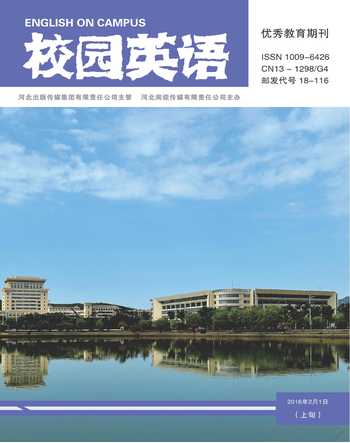The Implication of Designing a Workshop in English Teaching
李华
【Abstract】As a learning strategy, a workshops helps students acquire knowledge and skills, eliciting their intrinsic motivation. How to design a workshop depends on four principles. This paper aims to illustrate the implication of a workshop in English teaching.
【Key words】workshop; motivation; strategy
With intrinsic motivation as the foundation for English learning, the student's perspective is central to teaching. When students can see that what they are learning makes sense, their intrinsic motivation emerges. Engagement in learning is the visible outcome of motivation, the natural capacity to direct energy in the pursuit of a goal. To promote equitable learning among all students, a holistic, flexible pedagogy based on intrinsic motivation is needed. This is why what is learned at a workshop may be critical to the continuing advancement of students in terms of their English study.
Most workshops have a mission to develop applied knowledge and skills. Its learning objectives offer a way to state what students are likely to know, do, or feel. Once the learning objectives for the workshop are determined, the teacher is in a much better position to select content material and to create a cohesively designed program that establishes the four principles of the workshop. Critical to the design of a motivating workshop is a respectful understanding of the knowledge, skills, and especially the perspectives and concerns of participants. A perceptive awareness of workshop participants is indispensable to designing an excellent workshop.
The more harmonious the elements of the workshop design are, the more likely they are to evoke, encourage, and sustain intrinsic motivation. This includes four motivational principles as follows: 1. Creating a learning atmosphere in which students and teachers feel respected by and connected to one another. 2. Creating a favorable disposition toward the learning experience through personal relevance and choice. 3. Creating challenging, thoughtful learning experiences that include students' perspectives and values. 4. Creating an understanding that students are effective in learning something they value. These principles are essential for developing intrinsic motivation among all students throughout a workshop.
Because most workshops have specific learning objectives, they tend to be linear and prescriptive. In this manner, a workshop creates opportunities, experiences, and environments that are more likely to elicit students' intrinsic motivation. A motivational strategy is a deliberate teacher action or instructional process that is likely to enhance the participant's motivation to learn. Variety is stimulating and it draws students' interest toward its source. Collaborative learning includes the variety of teaching approaches involving joint intellectual efforts by students or by students and teachers together. In these situations, participants are working in groups of two or more, mutually constructing understanding, solutions, meanings, applications, or products. When participants can sincerely experience perspectives, ideas, skills, and situations approximating authentic instances of life, they have a real opportunity to enhance the meaning of what they are learning and to become more proficient. Feedback is information that students receive about the quality of their work. Teacher's comments and feedback enhance participants' motivation because they are better able to evaluate their progress, locate their performance within a framework of understanding, correct their errors efficiently, and maintain their efforts toward realistic goals. Feedback is probably the most powerful process that teachers can regularly use to affect students' competence.
In general, the learning acquired at workshops are more effective. Workshops are also the valid pedagogy for English learning. Following principles of designing workshops is a way to create learning experiences where inquiry, respect, and the opportunity for full participation happen.
References:
[1]Raymond J.Wlodkowski.1997.Motivation with a Mission: Understanding Motivation and Culture in Workshop Design.New Directions for Adult and Continuing Education,Vol76 p19-31.
[2]http://wiki.mbalib.com/wiki/%E5%B7%A5%E4%BD%9C%E5%9D%8A.

